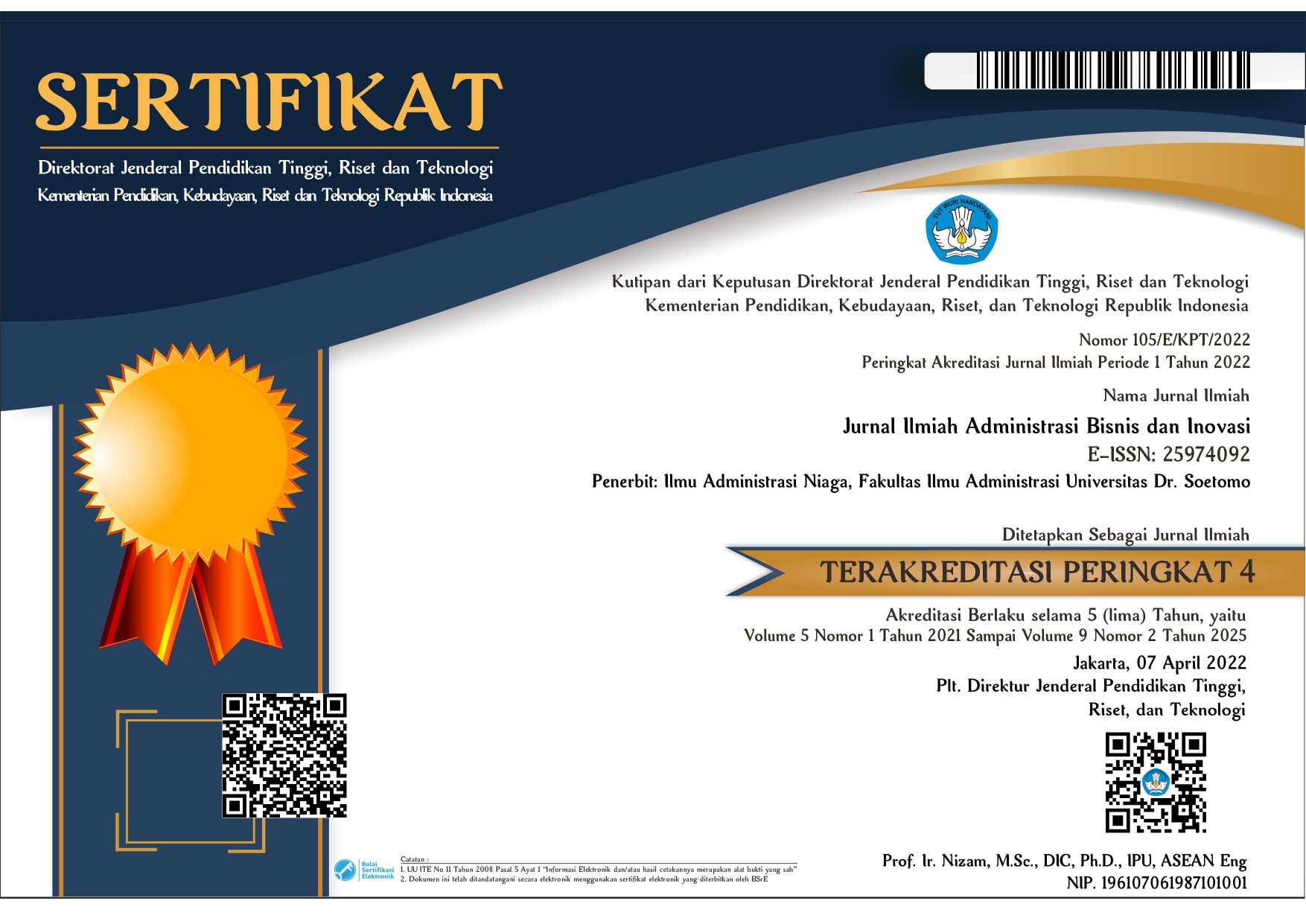PENGARUH INFORMATION OVERLOAD TERHADAP INTENTION TO MAKE UNUSUAL PURCHASES MELALUI PERCEIVED SEVERITY PADA MASYARAKAT KOTA BANDUNG SELAMA PANDEMI COVID-19
 Abstract views: 381
,
Abstract views: 381
,
 Full Text (PDF) (Bahasa Indonesia) downloads: 695
Full Text (PDF) (Bahasa Indonesia) downloads: 695
Abstract
The purpose of the study is to determine the influence of information overload on intention to make unusual purchases through perceived severity in the people of Bandung during the COVID-19 pandemic. This study uses quantitative methods with descriptive research types and causality. Sampling uses non probability sampling techniques with purposive sampling method to 100 respondents of Bandung city with a population of 2,510,103.00 people. Analysis of research data using tenik descriptive analysis and path analysis. The conclusion of the study shows variable information overload and perceived severity fall into the category of very high and variable intention to make unusual purchases fall into the high category. In addition, variable information overload had a significant effect on perceived severity of 46.92%. Information overload significantly affects intention to make unusual purchases by 6.25%. Perceived severity significantly affects intention to make unusual purchases by 19.80%. Information overload affects indirectly the intention to make unusual purchases through perceived severity of 30.48%.
References
Bandung, B. P. (2020). Jumlah Penduduk (Jiwa), 2018-2020. (Diakses tanggal 20 Desember 2020, dari: https://bandungkota.bps.go.id/indicator/12/32/1/jumlah-penduduk.html).
COVID-19, P. I. (2021, Januari 5). Total Kasus Terkonfirmasi. Retrieved from https://covid19.bandung.go.id/
Gantina, T. S. (2020, September 10). Hoaks atau Fakta: Beredar Pesan Berantai Sebut Bandung Kota Zona Hitam Virus Corona. (Diakses tanggal 14 Oktober 2020, dari Pikiranrakyat: https://tasikmalaya.pikiran-rakyat.com/cek-fakta/pr-06731628/fixriaupesisir.pikiran-rakyat.com?page=2).
Haryanto, A. (2020, Maret 6). Dipercaya Tangkal Corona, Jahe Merah dan Temu Lawak Langka di Cimahi. (Diakses tanggal 14 Oktober 2020, dari: https://daerah.sindonews.com/artikel/jabar/19846/dipercaya-tangkal-corona-jahe-merah-dan-temu-lawak-langka-di-cimahi).
Jati, A.S. (2020, April 2). Pandemi Corona, Penjualan Hand Sanitizer di E-commerce Meningkat 500%. (Diakses tanggal 14 Oktober 2020, dari detik: https://inet.detik.com/business/d-4961921/pandemi-corona-penjualan-hand-sanitizer-di-ecommerce-meningkat-500).
Jonathan, Sarwono. (2006). Metode Penelitian Kuantitatif dan Kualitatif. Yogyakarta:Graha Ilmu
Kencana, M. R. (2020, Agustus 13). 5 Produk yang Paling Banyak Dicari Konsumen Selama Pandemi Covid-19. (Diakses tanggal 20 Desember 2020, dari Liputan6: https://www.liputan6.com/bisnis/read/4330099/5-produk-yang-paling-banyak-dicari-konsumen-selama-pandemi-covid-19).
Laato, S. I. (2020). Unusual purchasing behavior during the early stages of the COVID-19. ScienceDirect, 1-12.
News, G. (2020). Coronavirus (COVID-19). Google News. (Diakses tanggal 14 Oktober 2020, dari https://news.google.com/covid19/map?hl=en-ID&gl=ID&ceid=ID%3Aen).
Pamungkas, W. W. (2020, Oktober 7). Pandemi Covid-19 Bikin Stres, RSJ Jabar Siapkan Layanan Konsultasi KJOL. (Diakses tanggal 14 Oktober 2020, https://bandung.bisnis.com/read/20201007/549/1302001/pandemi-covid-19-bikin-stres-rsj-jabar-siapkan-layanan-konsultasi-kjol).
Priansa, D. J. (2017). Komunikasi Pemasaran Terpadu. Bandung: Alfabeta
Priansa, D. J. (2017). Perilaku Konsumen dalam Persaingan Bisnis Kontemporer: Bandung
Ranawati, N. K. (2020, November 23). Positivity Rate Tinggi, Epidemiolog Minta Kota Bandung Terus Tes Masif. (Diakses tanggal 29 November 2020, dari https://ayobandung.com/read/2020/11/23/155890/positivity-rate-tinggi-epidemiolog-minta-kota-bandung-terus-tes-masif).
Sugiyono. (2016). Metode Penelitian Kuantitatif, Kualitatif, dan R&D. Bandung: Alfabeta.
Copyright (c) 2021 Jurnal Ilmiah Administrasi Bisnis dan Inovasi

This work is licensed under a Creative Commons Attribution-NonCommercial-ShareAlike 4.0 International License.
Authors who publish with Inform: JIABI: Jurnal Ilmiah Administrasi Bisnis dan Inovasi agree to the following terms:
Authors retain copyright and grant the journal right of first publication with the work simultaneously licensed under a Creative Commons Attribution License (CC BY-SA 4.0) that allows others to share the work with an acknowledgment of the work's authorship and initial publication in this journal.
Authors are able to enter into separate, additional contractual arrangements for the non-exclusive distribution of the journal's published version of the work (e.g., post it to an institutional repository or publish it in a book), with an acknowledgment of its initial publication in this journal.
Authors are permitted and encouraged to post their work online (e.g., in institutional repositories or on their website) prior to and during the submission process, as it can lead to productive exchanges, as well as earlier and greater citation of published work.








